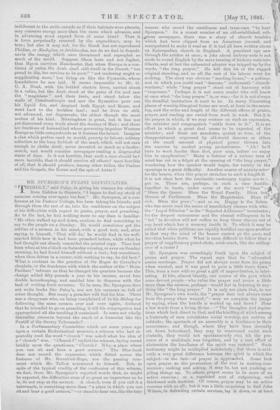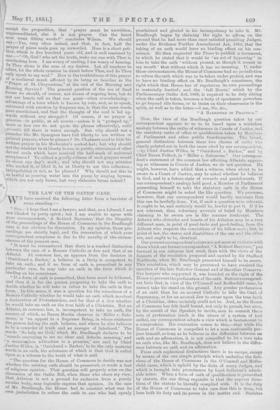MR. SPURGEON'S PULPIT DIFFICULTIES.
"THIRDLY," said Paley, in giving his reasons for shifting from Dalston to Stauwix, "I began to find my stock of sermons coming over again too fast." Mr. Spurgeon, at a con- ference at his Pastors' College, has been taking his friends, and through them the rest of us, into his confidence on the subject of his difficulties with regard to praise, prayer, and preaching. As to the last, he had nothing more to say than is familiar. "He often walked up and down, anxious to find something to say to the people on a Sunday. He would sometimes get the outline of a sermon in his mind, with a good text, and, after saying to himself, ` That will do,' he would find in his well- marked Bible how it had been preached before, while what ho had thought out closely resembled the printed copy. Time had been when at ten o'clock on Saturday evening, or even on Sunday morning, he had found himself without a text; but sometimes, when thus driven in a corner, with nothing to say, he did best." What a contrast to the practice of Sir Roger do Coverley's chaplain, or the frankness with which the author of the " Horm Paulinm " informs us that he changed his quarters because the change added fifty pounds a year to his income, saved him double housekeeping, and enabled him to dispense with the task of writing fresh sermons. To be sure, Mr. Spurgeon does not write books like Paley's, nor are his sermons so full of sober thought. But many a preacher will feel for him. There was a clergyman who, ou being complained of to his Bishop for delivering the same sermon over and over again, declared that ho intended to go on preaching it till his congregation had appropriated all the teaching it contained. Is some not wholly dissimilar resource beyond the reach of a humorist like the Pontiff of the Surrey Tabernacle ?
In a Parliamentary Committee which sat some years ago upon a certain Ecclesiastical measure, a witness who had re- peatedly used the word " church " was asked what his idea of a church" was, " Church ?" replied the witness, facing round briskly upon the questioner, " Church ? Why, a place where you can sit and hear a good sermon." The Blue-book does not record the expression which flitted across the features of Mr. Beresford-Hope, nor the passing com- ment which Mr. Talbot murmured to himself. But, in spite of the typical crudity of the confession of this witness, we find, from Mr. Spurgeon's reported words that, as might be expected, the difficulties even of so great an improviser as he is, do not stop at the sermon. A church, even if you call it a tabernacle, is something more than " a place in which you can sit and hear a good sermon,"—or stand to hear one, like the lute- Mr. Spurgeon was exceedingly frank upon the subject of praise and prayer. The report says that he "advocated praise meetings. Prayer did not always come from his pump when wanted, and it was good to pour a little water down." This, from a man with so great a gift of improvisation, is inter- esting. It hits, almost bluntly, one source of the pain which some devout people—who value the prayer and praise a little more than the sermon, perhaps—would feel in listening to any- thing like " the long prayer." It is only too plain that, to use Mr. Spurgeon's own words, the " prayer does not always come from the pump when wanted ;"—may we complete the image by saying, when the handle is worked up and down ? Hear a few words from a living divine :—" The thoughts and aspira- tions which look direct to God, and the kindling of which among a fraternity of men constitutes social worship,' are natives of solitude ; the spectacle of an assembly is a hindrance to their occurrence; and though, where they have been devoutly set clown beforehand, they may be reassumed under such obstacle, they would not spontaneously riso, till the pre- sence of a multitude was forgotten, and by a rare effort of abstraction the loneliness of the spirit was restored." Such testimony might be multiplied indefinitely ; but there is evid- ently a very great difference between the spirit in which the subject—or the fact—of prayer is approached. Some look upon prayer as the prostration of the soul in waiting com- munion ; seeking and asking, it may be, but not pushing, or piling things up. To others, prayer seems to be more of an active exercise; or a regulated sort of outpouring, well thickened with doctrine. Of course, prayer may be an active exorcise with us all ; but it was a little surprising to find John Wilson, iu defending certain services, lay it down, or at least comers who crowd the omnibuses and tram-cars "to hear Spurgeon." In a recent number of an old-established reli-
*glens newspaper, there was a story of church troubles which had been clipped from an American journal, and manipulated to make it read as if it had all been written about an Episcopalian church in England. A practised eye saw through the artifice at once; a joke about hickory-nuts is not made to sound English by the mere turning of hickory-nuts into filberts, and at last the exhausted adapter was tripped up by the words, " the long prayer." He left this bit of the rugged original standing, and so all the rest of his labour went for nothing. The story was obvious " meeting-house,"—a palimp- sest in which you could read "deacons " underneath " church- wardens," while "long prayer" stood out of harmony with "responses." Perhaps it is not every reader who will know at once what " the long prayer " is, or was,—for it is not always the dreadful institution it used to be. Ia many Dissenting places of worship liturgical forms are used, at least in the morn- ing, and the order and length of the different offices of praise, prayer, and reading are varied from week to week. But it is the prayer in which, if we may venture on such an expression, the minister and congregation "settle down to it." It is an effort iu which a great deal seems to be expected. of the minister ; and there are anecdotes, quaint as true, of the disappointment expressed by old-world deacons or elders at the small amount of physical power thrown into the exercise by modest young probationers. " Ah I he'll have to work harder than that, poor man, before we enjoy him in supplication." Many a listener of a serious turn of mind has sat in a fidget at the opening of "the long prayer," wondering how the speaker would begin, for variety in the openings is a great difficulty. Another source of anxiety arias' for the hearer, when this prayer stretches to such a length a it is not clear how the inevitable customary topics are to got in. These are, perhaps, in such a case huddle', together in haste, nudes cover of the word " bless " " Bless the Queen. Bless the Royal Family. Bless bock Houses of Parliament. Bless the Magistrates. Bless th)4 rich. Bless the poor ;"-and so on. Happy is the listen( co who has never read the series of beuedictory clauses with whit.
the " Loyal Effusion" in the " Rejected Addresses" terminates ; for the deepest seriousness and the utmost willingness to be " led" in devotion will not suffice to keep those clauses out of any head which has a memory inside it. To which it may be added that when petitions are rapidly huddled one upon another in that way the mind of the hearer cannot go the pace, and devotion breaks down. What is more difficult to follow than a prayer of supplicatory pistol-shots, crick-crack, like the calling- over of a roster ?
aocept the proposition, that " prayer must be unwritten, unpremeditated, else it is not prayer. Can the heart -ever want fitting words P" concludes Wilson. We should say,—yes, very often indeed, and that, in fact, half the prayer of pious souls goes up unworded. Here is a short peti- tion, which is five hundred years old, and is well seasoned by use :—" Oh, God I who art the truth, make me one with Thee in everlasting love. I am weary of reading, I am weary of hearing. In Thee alone is the sum of my desires. Let all teachers be :silent, let the whole creation be dumb before Thee, and do Thou -only speak to my soul." How is the truthfulness of this prayer of a mcdiiuval monk affected by its being as familiar as the "Prayer of St. Chrysostom," at the end of the Morning and Evening Service ? The general question of the use of fixed :forms we should, of course, not dream of arguing hero, but do not our hearts tell us that one great—often overwhelming— :advantage of a form which is known by rote, and, so to speak, saturated with emotion by frequent use, is that the mere words pass uncriticised, and that the thought of the soul is led up- i wards without any struggle ? Of course, if no prayer is lenuine—in public, at all events—unless it is " pumped up," more or less (we do not quote the phrase offensively), cadit 1,qzoestio till there is water enough. But why should not a Poacher like Mr. Spurgeon have full liberty to use written or ;printed prayers, when he pleases ? Dr. Chalmers used to hide his written prayer in his Moderator's cocked-hat; but why should amt the minister be at liberty to u so, in public, utterances of other devout souls which have received the ball-mark of universal acceptance ? To collect a goodly volume of such prayers would be about one day's work ; and why should not any minister who needed it, or liked it, be at liberty to use this collection ; -interpolating or not, as he pleased ? Why should not this be as lawful as pouring water into the pump by singing hymns, which are not only forms, but very elaborate forms indeed ?



































 Previous page
Previous page